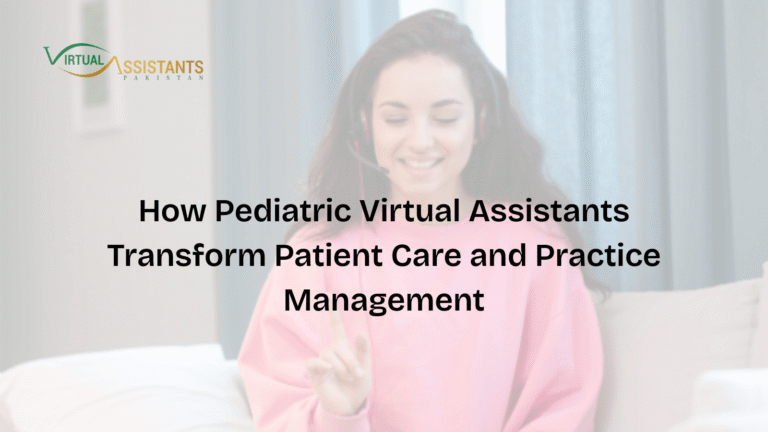
In today’s busy healthcare world, pediatric clinics must balance providing quality care with managing a substantial amount of paperwork and administrative tasks. This can also be hard and time-consuming. A virtual pediatric assistant can also help by making daily work easier, reducing costs, and allowing doctors more time for patient care.
To manage multiple tasks, many pediatricians are turning to pediatric virtual assistants. At Virtual Assistant Pakistan, we provide trained and HIPAA-certified virtual assistants who understand the special needs of pediatric clinics.
In this article, we’ll explain why you might need a virtual pediatric assistant, the right time to hire one, and how the process works. We’ll also answer common questions people ask about this service.
A pediatric virtual assistant is a remote worker trained to handle both medical and administrative tasks for child healthcare practices.
They’re not just general assistants — they understand the special needs of pediatric care, like immunizations, growth tracking, and parent communication.
While a general VA might only manage calendars or emails, a virtual assistant for pediatric practices has medical knowledge. They can update EHR systems, follow HIPAA rules, and work directly with parents about their child’s care.
Appointment Scheduling and No-Show Management
Keeping appointments organized is one of the biggest challenges in pediatrics. A pediatric appointment scheduling virtual assistant can:
From immunization records to growth charts, accuracy matters. A VA can:
Parents often have questions before and after visits. A remote pediatric healthcare assistant can:
Virtual care is growing fast. VAs can help by:
Virtual assistants help doctors by doing office tasks. This gives doctors more time to care for children. They also have lower costs than hiring regular staff. In the end, care becomes easier and less stressful for families and staff.
Virtual assistants handle:
AI assistants answer simple questions instantly (like office hours).
Automation tools:
Many small pediatric clinics use virtual assistants only for scheduling, sending reminders, and handling billing. This enables them to save time and helps doctors focus on patients.
Bigger pediatric practices often use teams of virtual assistants to manage insurance, update records, and organize appointments. This makes the office run more easily and reduces mistakes.
Offshore assistants may cost less, but U.S.-based VAs often have stronger healthcare compliance training and easier communication.
Some pediatricians prefer hiring through agencies that provide trained medical VAs. Others choose independent contractors for more flexibility.
A medical assistant in the form of a virtual assistant to the pediatrician is not only an additional assistant, but also a good companion to work with more effectively and manage the practice.
These assistants streamline clinics and make them more efficient and parents more satisfied with such features as scheduling and billing, telehealth, and updates on EHR. They also eliminate stress among staff members since they do the routine duties that are likely to consume a lot of time.
Clinics do not have to spend as much as they spend on recruiting in-house employees, yet the quality of the service remains high. Online reservations, supported by pediatric VA, can be rapidly adjusted to the clinic requirements, be it the busy phone line or the need to process online appointments.
Having been trained and communicated with, they can turn out to be a significant component of the healthcare team. Finally, employing a pediatric virtual assistant will give the physicians more time to spend on what is most important to them, which is taking care of children.
WhatsApp us